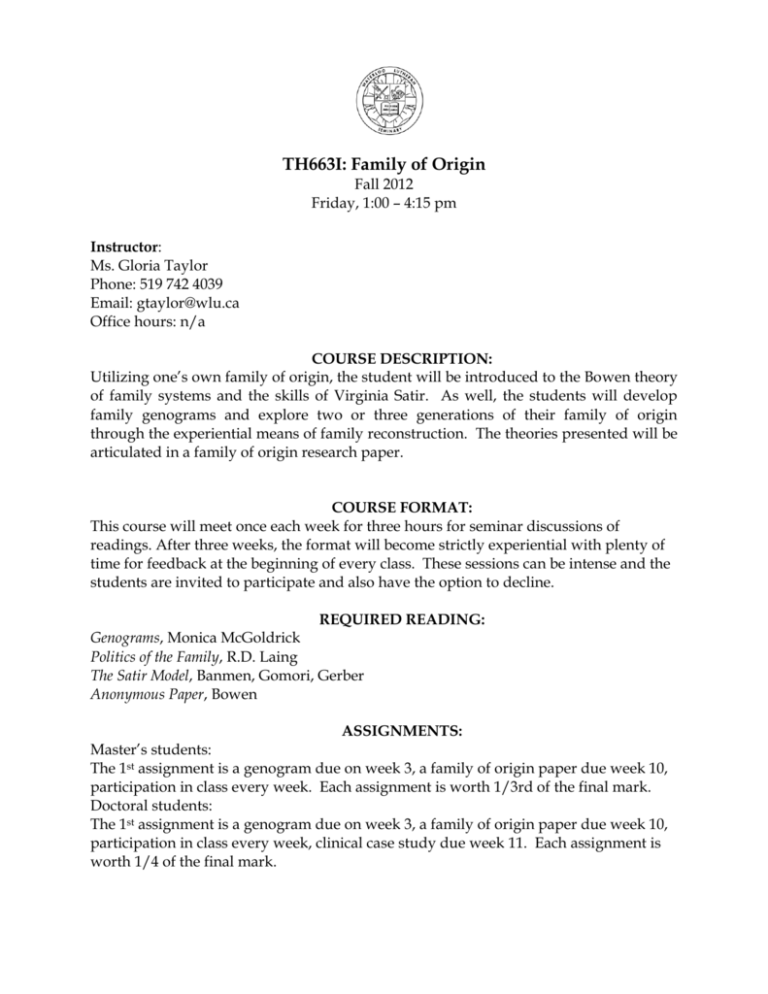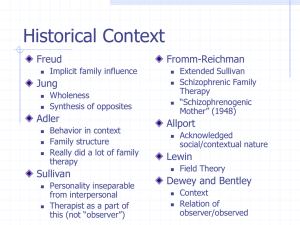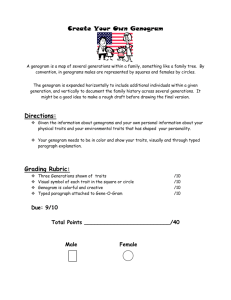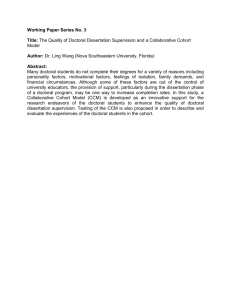TH663I: Family of Origin
advertisement

TH663I: Family of Origin Fall 2012 Friday, 1:00 – 4:15 pm Instructor: Ms. Gloria Taylor Phone: 519 742 4039 Email: gtaylor@wlu.ca Office hours: n/a COURSE DESCRIPTION: Utilizing one’s own family of origin, the student will be introduced to the Bowen theory of family systems and the skills of Virginia Satir. As well, the students will develop family genograms and explore two or three generations of their family of origin through the experiential means of family reconstruction. The theories presented will be articulated in a family of origin research paper. COURSE FORMAT: This course will meet once each week for three hours for seminar discussions of readings. After three weeks, the format will become strictly experiential with plenty of time for feedback at the beginning of every class. These sessions can be intense and the students are invited to participate and also have the option to decline. REQUIRED READING: Genograms, Monica McGoldrick Politics of the Family, R.D. Laing The Satir Model, Banmen, Gomori, Gerber Anonymous Paper, Bowen ASSIGNMENTS: Master’s students: The 1st assignment is a genogram due on week 3, a family of origin paper due week 10, participation in class every week. Each assignment is worth 1/3rd of the final mark. Doctoral students: The 1st assignment is a genogram due on week 3, a family of origin paper due week 10, participation in class every week, clinical case study due week 11. Each assignment is worth 1/4 of the final mark. Course Term and Year Page 2 FINAL EXAMINATION: There is no final examination RELATIONSHIP TO CURRICULUM: This course is an elective PREREQUISITES: None COURSE OUTCOMES By the end of this course, the student will be expected to have an awareness of the family of origin dynamics that determined the ‘atmosphere’, rules, roles etc. into which the student was born and raised. This awareness gives choices that were not previously evident. The goal of this course is to provide the student with the means to become more compassionate, aware and present in order to serve others with whom they live and work. This course meets the following proposed competencies for the Transitional Council of the College of Registered Psychotherapists of Ontario: 1.1.b Integrate knowledge of contextual and systemic factors that facilitate or impair human functioning 1.2.a Integrate the theory or theories upon which the therapist’s practice is based 1.2.b Integrate knowledge of how human problems develop, from the viewpoint of the therapist’s theoretical orientation 1.2.e Establish a therapeutic relationship informed by the theoretical framework 1.4.a Integrate knowledge of the impact of the therapist’s self on the therapeutic process 1.5.a Integrate knowledge of human diversity 3.4.1 Undertake critical self-reflection 4.2.a Employ empathy, respect, and authenticity 4.2.b Establish rapport 4.2.c Demonstrate awareness of the impact of the client’s context on the therapeutic process 4.2.d Demonstrate sensitivity to the setting in which therapy takes place 4.2.e Assume non-judgmental stance 4.2.g Foster client autonomy 4.2.h Maintain appropriate therapeutic boundaries 4.2.j Take all reasonable measures to safeguard physical and emotional safety of client during clinical work 4.2.k Employ effective skills in observation of self, the client and the therapeutic process 4.5.b Identify and respond appropriately to client’s strengths, vulnerabilities, resilience and resources Course Term and Year Page 3 This course has traditionally met AAMFT requirements. Direct inquiries to AAMFT and submit syllabus for approval. Speak to the instructor for further information. COURSE PHILOSOPHY As Virginia Satir stated, “we can all become more fully human.” This course is primarily experiential and trusts that the body, in concert with the new information, provides access to transformation. READING ASSIGNMENTS Students are expected to read Genograms by Monica McGoldrick to prepare for the first assignment due on week four. The Satir Model by Banmen, Gomori and Gerber is the main text which will provide detailed information on the philosophy of the course and many of the experiential exercises. “The Anonymous paper” by Murray Bowen will be available at the WLU Bookstore and provides the substance of family of origin theory. Politics of the Family by R.D.Laing will be explored by the students prior to the visiting professor who will take the class through some of the family of origin puzzles. All books will be available at Words Worth Books on King St. across from the Waterloo Square. A representative from Words Worth Books will be at the first class to sell texts. WRITTEN ASSIGNMENTS The first assignment is the creation of a family map (genogram) that explores three generations of the student’s family of origin. Details such as birth order, descriptive adjectives, crises, emotional cut-offs expectations, rules, roles, similarities and differences, illnesses and causes of death as well as family secrets are to be included. There will be useful strategies provided in class time. This assignment is due on week four of class and is worth 1/3 of the mark for master’s students and 1/4 of the mark for doctoral students. The family of origin paper is due on the 10th week of class. It will articulate the theories, experiential exercises and readings of this course as they apply to each student’s family of origin. Both papers may involve asking family members for information although that is not always possible. Marks for this assignment are based on the particulars of the exploration and the insights that are acquired. The family of origin paper is worth 1/3 of the mark for master’s students and 1/4 of the mark for doctoral students. Doctoral students are also required to write a clinical case study using themselves as the case subject and applying the ideas of Satir, Bowen, Laing and any other systems therapist to the case. The student will figure out their age as client and identify the presenting problem this client brings to therapy. The student will then assess the client’s therapeutic needs and address how to work with the client over the course of therapy. The case study is worth 1/4 of the mark for doctoral students. Participation in the exercises, feedback opportunities and attention to theory as it applies to the reconstruction are the remaining 1/3 of the mark for master’s students or 1/4 of the mark for doctoral students. Course Term and Year Page 4 Students are invited to maintain contact with the instructor for any issues or surprises that emerge during this term. There is a strict policy of confidentiality. What emerges in this class will be addressed in this class. Students may apply for extensions when the circumstances present problems. Late assignments will be discussed with the instructor and all assignments are to be returned to the student by the last class. Assignments must be handed in in paper copy in class on the assigned due date. GRADING WLU and WLS use a letter-grade system. For students in all programs, the lowest passing final grade for master’s students is B-. The lowest passing grade for doctoral students is B. Summary of WLS Expectations and Guidelines: 1. Please read the guidelines for inclusive language at: http://www.wlu.ca/~wwwpa/styleguide.pdf 2. Please read the WLS / WLU policies on academic and research ethics at: http://www.wlu.ca/~wwwgrads.gradcalendar/policies.htm 3. Please refer to the Seminary website for information on grade disputation. 4. Use of social media is discouraged during class as it is counterproductive to group and individual learning. 5. Please contact the Accessible Learning Centre before the start of term to arrange any necessary accommodations. COURSE SCHEDULE Week one will introduce students to the main expectations of the instructor. There will be time for discussion and questions and answers. Weeks two to four will be expanded information on the genogram and exercises to warm the class to a space of trust and familiarity among the group members. On week five there will be a demonstration of a family reconstruction during which students will be invited to sign up for this transformational experience. Weeks six to ten will begin with feedback and explorations of the theories from the reconstruction the previous week. Instructions on the form and usefulness of feedback will be a constant part of this process. At all times, respect for Course Term and Year Page 5 the participating students will be valued. Presence in each class is important and the instructor must be notified if this will not be possible. READING AND ASSIGNMENT DUE DATES Week 1: Introduction Week 2: Readings—Laing and McGoldrick Week 3: Readings—Laing Week 4: Readings—Bowen and Satir, GENOGRAM DUE Weeks 5—11: Reconstructions Week 10: FAMILY OF ORIGIN PAPER DUE Week 11: CLINICAL CASE STUDY DUE (doctoral students only) Week 12: Wrap-up





